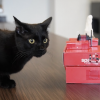×
SparkFun will be closed on Tuesday, December 24th, and Wednesday, December 25th, in observance of the Christmas holiday. Any orders qualifying for same day shipping placed after 2:00 p.m. (MST) on Monday, December 23rd, will be processed on Thursday, December 26th, when we return to regular business hours. Wishing you a safe and happy holiday from all of us at SparkFun!
Please note - we will not be available for Local Pick up orders from December 24th-December 27th. If you place an order for Local Pick-Up we will have those ready on Monday, December 30th.
We'll start off with a cool project that comes from the OpenCV community. This project uses OpenFrameworks, an array of LED lights with a mirror finish, IR camera and a bit of motion tracking. The mirror finish makes it appear so that your reflection shows when the lights are off.
And now on to the new products!

This is a great beginner's embedded electronics kit featuring a surface mount version of the BASIC Stamp 2. The BS2-IC is mounted on a project platform, which features a 9-pin serial connector, breadboard area, power and reset buttons and more. The kit also comes with a components pack - complete with LEDs, a servo motor, buzzer and more - to support you in building over 40 projects!
The Board of Education Full Kit is a concise package of all the hardware you need to begin building projects with the BASIC Stamp microcontroller. Everything you need is included except for a power supply, and components needed to build a specific project. The beginner parts kit would pair really well with this board.
The Boe-Bot is a popular robotics kit based on Parallax's BASIC Stamp 2 microcontroller. Over
90,000 Boe-Bot robots are in use by hobbyists, educators and students around the world. Starting with basic movement and proceeding to sensor-based projects, customers quickly learn how the Boe-Bot is expandable for many different robotic projects. No previous robotics, electronics or programming experience is necessary.
The XL series of MaxSonars are a super high-performance version of the easy-to-use sonar range finder from Maxbotix. The XL series of this sensor features higher resolution, longer range,
higher power output and better calibration when compared to the LV version. We carry the EZ0, EZ1, EZ2, EZ3, and EZ4.
This is a simple, thumbnail-size RFID tag. These tags are great for sensing presence, identification, etc., and they're small, so they can be easily sewn into clothing or inserted into enclosures. Each tag comes with a unique 32-bit ID code and is not reprogrammable. The carrier frequency of this tag is 125kHz, so it works great with our ID-2, ID-12 and ID-20 RFID readers.
This is a glass, cylindrical RFID tag; it's very similar to those implanted into pets for identification purposes (though we're not saying you should try that with this tag). Each one comes with a unique 32-bit ID code and is not reprogrammable.
We love heat shrink! We use it for all sorts of handy projects. Use it to reinforce connections, protect devices, and electrically isolate exposed solder joints. We worked with a manufacturer to create a kit that we would use: lots of colors, lots of sizes, nothing too long. We specially requested some of the sizes with heat sensitive glue which significantly increases stress relief and water proofing. This kit includes 95 pieces of heat shrink, all of varying colors and sizes, and comes in a clear bag.

Another plug for the RoboJoust - it's coming up soon! This is the latest competition for SparkFun that combines line-following with sumo wrestling with jousting with combat robots...it's the RoboJoust! Go the page to read the rules and reserve your team's place!














I dont know if anyone knows this, but on the front page of the Wall Street Journal was an article on tinkering and mentioned Sparkfun, Make Magazine, and the Maker Faire, among other things!!!! http://online.wsj.com/article/SB125798004542744219.html
Ditto Richard. Parallax Rocks. Start off with a Basic Stamp, learn, and progress to the Propeller!
And of course, add some SparkFun sensors, wireless modules, LCDs, etc, etc...!
When I started messing with electronics I started with the basic stamp (Boe Bot) and I wouldn't recommend it to anyone else. The BS is way over prices and extremely slow. The PIC is used as an interpreter, it read the instructions from external memory.
I would recommend a beginner to use the Arduino, I've never tried it myself but they look like a good place for beginners, much better than the BS2 IMHO, or, for the ambitious people, just use the microcontroller stand-alone and follow SparkFun's great tutorials.
I agree with you EmbeddedMicro! The Parallax stuff is way to expensive and most of it only works with Windows:( I think the Arduino is a much better route to start with and it can be used on any computer platform:) Also the Arduino stuff will not break the bank! That's nice if you are on a real small budget.
This is a simple, thumbnail-size RFID tag. These tags are great for sensing presence, identification, etc., and they're small, so they can be easily sewn into clothing or inserted into enclosures. Each tag comes with a unique 32-bit ID code and is not reprogrammable. The carrier frequency of this tag is 125kHz, so it works great with our ID-2, ID-12 and ID-20 RFID readers. how to grow taller 4 idiots
Yes, the BOE-BOT may be a little overpriced, but where else can you find such a comprehensive starter-kit with such fantastic instruction manuals? Most people starting out in embedded electronics prefer a "learn the basics" kit rather than having to spend so much time trawling through datasheets to check for instructions and compatibility.
I started my embedded electronics with a Boe-Bot, and yes the stamp is a little overpriced and slow, but thats the idea - it's a good starting point.
Start here, move onto a Properller - 8 core processing for under ?5? You just can't beat it...
i agree with you dear.... it is too expensive but i tried this one to add on my custom essay site for a change.
I can't think of a better, or easier, or faster way to begin learning about electronics and microprocessors. What ended up being the deciding factor for me was the quality of the Parallax instruction manuals. You won't find better written educational materials anywhere.
error fix
I dont know if any of you know about this but sparkfun as well as make magazine, and other companies such as yours were featured in this front page article in the Wall Street Journal!!!!
Lumiblades look sweet!! When will we be able to buy them from SparkFun?
I started my electronics education with Parallax's "What's a Microcontroller?" (offered above as "beginner's embedded electronics kit") and progressed to the Boe-Bot kit. I can't think of a better, or easier, or faster way to begin learning about electronics and microprocessors. What ended up being the deciding factor for me was the quality of the Parallax instruction manuals. You won't find better written educational materials anywhere. They really got me going quickly and painlessly. By the time I had my Boe-Bot autonomously roaming around my house, I was ready to tackle more complex systems. In this respect, the Basic Stamp system with the Stamps in Class board, the Homework board, and the Board of Education are most definitely worth the money. In fact, I still use these boards today for experimenting with new sensors & etc.
I don't believe processing speed really matters to beginning students. In fact, in some cases, a fast processor can actually cause problems, especially for beginners.